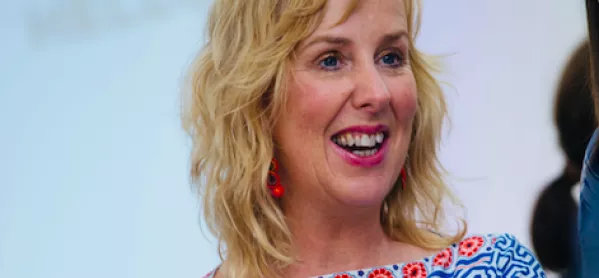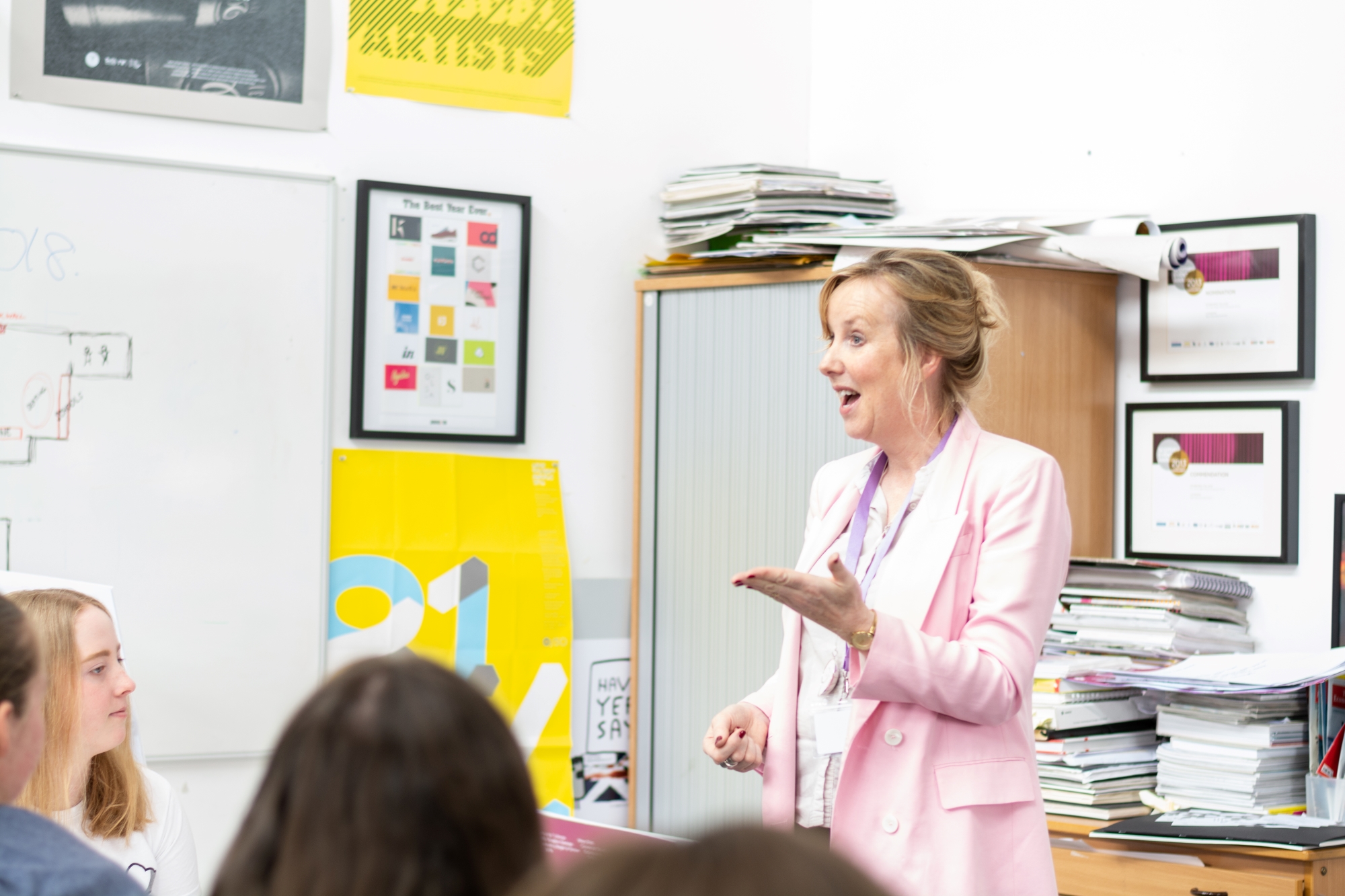- Home
- Meet Helena Good: Tes FE’s teacher of the year
Meet Helena Good: Tes FE’s teacher of the year

“I haven’t stopped smiling since the awards. There are just so many teachers out there who go above and beyond – it was a massive honour to even be shortlisted alongside them, let alone win,” says Helena Good.
“I got dressed up, put on the dress that I would have worn with my slippers, and my husband and I watched it with all of the family on Zoom. The lovely thing about it was that normally if you win something and you're with seven other people who haven't, you're very aware of that. But when you're at home you can scream.”
Helena Good is a lot of things – she’s friendly, fun and warm, someone that you instantly want to have a chat and a cup of tea with – but above all, she’s a passionate and dedicated teacher. When she talks about learning and shares stories of her students’ success, she lights up.
“I’m incredibly lucky that my vocation is my career – teaching isn’t just a job for me,” she says.
And it’s that – the unwavering and genuine commitment to education and what it can do for learners – which makes her such a worthy winner of this year’s Teacher of the Year award at the Tes FE Awards.
News: College funding increases set to be 'eroded' by Covid
More: The college turning students into Daydream Believers
Background: Helena Good wins at the Tes FE Awards 2020
A desire to teach
Good was born in Newry, Northern Ireland. She says that from an early age, she knew she wanted to teach. Her parents were both teachers – her father at a college and her mother at a primary school.
“Teaching was always in my DNA. I used to set up summer school classes for my brothers and sisters. You can imagine how popular they were,” she laughs.
“I see the desire to learn in my parents: and that made my childhood interesting. Learning was never just something that happened in the classroom, learning was always all around us, and we were always encouraged to learn, but also to share and to give it back."
However, despite a clear aptitude and desire to teach, Good wanted to get “real-world” experience before stepping into the classroom. After a grammar school education, she went to study graphic design and visual communication at Manchester Metropolitan University.
A five-year stint in a graphic design agency in Edinburgh followed. She says that while she had a brilliant time at the agency – it’s where she met her husband – and learned a lot, teaching was always at the back of her mind. It was no surprise to anyone, she says, when she left the agency to teach graphic design at what was then Falkirk College.
There she was part of a very young team (“We’d be asked for ID when we were in the staff toilets because they thought we were students," she says) who were all new and who could all bring the industry into the classroom.
“I loved this ability to share my insights – because I worked in industry, to be able to bring those connections into the classroom and contextualise learning has always been a massive focus for me,” she says.
“I always think that if students say 'Well, what's the point in this?' you should ask yourself that as a lecturer. It's a really good question to ask because then you have to justify it to yourself, and you have to justify it to the students. And very often the way I do that is bringing in industry.”
Good moved from Falkirk to Telford College, which then became part of Edinburgh College after a merger a few years ago.
Bringing industry into the classroom
During her time in Edinburgh, Good has stuck to her industry roots and has sought out opportunities to bring the workplace into the college wherever she can. For a number of years, Good has led a mentoring scheme for HND students where they receive guidance and advice on their studies and future careers from those working in graphic design.
“I think that industry and employers really do want to help – it’s education that only opens the door ever so slightly, and there are many reasons for that. People are scared: as a lecturer, you're scared if you bring in someone from the real world and they stand there and tell you what you're doing is irrelevant – well, what happens next?” she says.
“But actually, if you open up the door, then it's amazing. The energy that comes from people coming in and telling their story is fantastic.”
Students see the value in engaging with and making connections with employers – so much so, that when they go on to become part of the workforce themselves, they are willing to come back into the classroom, says Good.
“One of the most beautiful moments as a teacher is when an ex-student comes back into the classroom as a mentor and you know their story,” she says.
“You've sat with them in a room and they've been upset, you've sat with them when they couldn't present in front of a class. They stand up in front of the whole class and they tell their story and it's just beautiful. Those are the moments that you love your job.”

The Daydream Believers
While the FE awards judges recognised the importance of Good’s mentor initiative, it was her more recent programme, Daydream Believers, that really impressed them – calling it the most important educational initiative in Scotland at the moment.
The idea, Good says, came from the mentoring programme. She saw the value for college students and decided that primary and secondary students should benefit from time with employers, too.
“There's a lovely quote which is: 'Don't get ready, start,'” she says.
“So we got a group of people together around the table who were tired of talking about changing what was happening in our schools and said, 'Right OK, how do we make this happen?'”
With her team, Good created a platform that allowed employers, universities and colleges to directly influence creative thinking, problem-solving and critical skills in the classroom. They asked employers to think about themselves at 13, and what would have made an impact on them. Ultimately, they ended up with a bank of 50-minute lessons that primary and secondary teachers could use as they wished.
“It's about bringing the real world into our classrooms. The response has been fantastic: universities are able to create lessons on the skills they want to see young people coming through with and employers can see a direct link with the future workforce,” she says.
Being vulnerable
As well as the importance of bringing industry into the classroom, fundamental to Good’s teaching ethos is not to take herself too seriously. She posted a video of herself on Twitter a couple of weeks ago that showed her singing and dancing to Queen’s Don’t Stop Me Now in front of her class.
“I decided to put that out there to show that you shouldn’t take yourself so seriously, and being vulnerable and showing yourself singing out of tune and dancing – that's what that was,” she says.
“With that particular lesson, and it's a feeling that I'm sure many teachers can identify with, when you walk into a classroom and people are tired and people are disengaged. They are looking at their watches and wanting to go home early.”
The past eight months have been a learning curve for Good. She says that teaching remotely in a room by herself feels like a “completely new job” – but that humility is key.
“If you give yourself a little bit of leeway for making mistakes, there's a humility that comes with that. You have to stand alongside your learners and say, 'I'm learning as much as you are.'
"They've taught me so many things. When things go wrong, they'll say, 'Helena, try this or that.' It can make you feel vulnerable because you think you should know it all, but once you accept that it's a new job, and we're all learners, then you let go and see what happens.”
Good says that she starts every class with a song, and as students come into the virtual classroom they all dance and sing along. “Sometimes it feels like I’m running a radio station,” she laughs. She says these moments of togetherness reinforce the feeling that the class is a family.
That family feeling
It’s that feeling of family that Good says is so important for students at the moment. In Scotland, the emphasis is still on remote learning first, unless face-to-face teaching is deemed to be essential. For Good and her students, all learning continues to be 100 per cent online, and it has been since March.
“Mental wellbeing is a big challenge," she says. "This morning, I got students to share how they are going to take care of themselves over the next couple of weeks. What we're trying to get them to do is to support each other in doing that, so they've committed to different things and we're going to tune in and say, 'Well, how is that going? I can support you to get out for that walk every day.'
“It comes back to the family. You need to know that even though you're in your bedroom at the minute, that there is a family out there that cares about you. It’s that community aspect to learning that colleges do so well – and we need to ensure that students still feel that.”
Good says that the key lesson she has learned from the pandemic is to take things day by day. She says she absolutely loves her job, but that she’s always open to any new possibilities or opportunities.
“Things change so quickly and, at the minute, I am here talking to you about being teacher of the year. I've been incredibly honoured and am so grateful to have won that award,” she says.
“You gave me a moment, and all of my family a moment that we will never ever forget in all of our lives.”
Keep reading for just £1 per month
You've reached your limit of free articles this month. Subscribe for £1 per month for three months and get:
- Unlimited access to all Tes magazine content
- Exclusive subscriber-only stories
- Award-winning email newsletters



